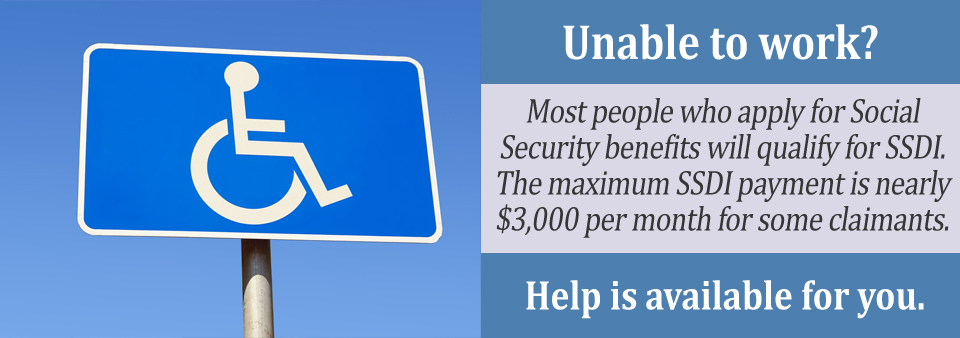Do you suffer from a medical condition that prevents you from living a healthy, functional life? If so, you are not alone. Millions of Americans suffer from disabilities that keep them from working and living life how they’d like. For these people, Social Security disability insurance (SSDI) is a great option.
When considering disability benefits, it is always best to consider a consultation with a disability attorney or disability advocate. Before you get started, here are the top five things to know about SSDI to help let you know if you'll qualify:
1) Most people on disability benefits receive SSDI.
Two main Social Security programs provide money to people with disabilities: Social Security disability insurance (SSDI) and Supplemental Security Income (SSI). While they sound similar, they are awarded slightly differently and are even obtained simultaneously by some people who qualify. The vast majority of people on Social Security disability receive SSDI benefits.

To qualify for SSDI, you must suffer from an SSA-approved disability and demonstrate an inability to work and function at a proper capacity. Those who qualify can receive SSDI payments. However, to qualify for SSI, you must fit the above requirements and earn less that the income limit determined by your state. If the SSA deems your application fitting of both SSDI and SSI’s requirements, you will receive both.
2) Eligibility is largely work-based.
A large portion of your application decision is based on your current income and your ability to work. For example, in order to qualify for SSDI, you must earn below a certain amount each month (called “substantial gainful activity”, or SGA) in order to demonstrate need. There is no limit on income from other sources outside of working.
Decisions are also based on whether or not you are capable of working at all. When reviewing your case, the Social Security Administration (SSA) looks over your work history and the physical requirements of your past jobs. If your disability prevents you from working these past jobs, you are more likely to qualify for disability benefits.
3) You must have worked recently to be eligible.
To qualify for SSDI, you must have contributed a certain amount of money in taxes to the SSA. These contributions are measured in “credits”, of which you can receive four per year.
Depending on your age, you need a certain amount of credits to qualify for SSDI. A certain number of these credits must be earned in the 10-year period before you became disabled. If you have continuously contributed to the SSA in your working years and file close to the period after which you became disabled, your application is much stronger.
4) Spouses do not affect eligibility.
While your income and work history is considered during evaluations, your spouse’s income and work history have no effect on your eligibility. In fact, any income earned from your spouse, interest, or investments are not considered when you apply for SSDI — only your income from work is considered.
5) Children may also be eligible to receive benefits.
While children are not the main recipients of SSDI, over 200,000 Americans under the age of 25 currently receive disability benefits. Benefits are given to children with qualifying disabilities whose parents do not make enough money to engage in SGA.
“Child” benefits can also be awarded to disabled adults who are taken care of by a parent that has earned enough credits to qualify for Social Security payment.
Contacting a Social Security Attorney
If you feel that you may qualify for disability benefits, it is wise to consult with a disability attorney. A disability attorney or advocate is an irreplaceable resource when filing out applications, keeping paperwork organized, and aiding you in the appeals process if necessary. To give yourself the best chance at receiving the assistance you deserve, speak with a disability attorney today.